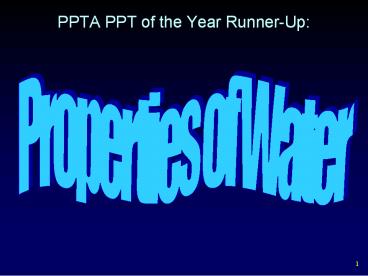PPTA PPT of the Year Runner-Up: - PowerPoint PPT Presentation
1 / 13
Title:
PPTA PPT of the Year Runner-Up:
Description:
Title: PowerPoint Presentation Author: Valued Gateway Client Last modified by: Scott Montgomery Created Date: 9/1/2003 3:30:09 PM Document presentation format – PowerPoint PPT presentation
Number of Views:81
Avg rating:3.0/5.0
Title: PPTA PPT of the Year Runner-Up:
1
PPTA PPT of the Year Runner-Up
Properties of Water
2
Forms of Water
0o C - 100o C Liquid
lt 0o C - Ice
gt 100o C - Vapor
3
Properties of Water
Covalent bonding vs. Hydrogen bonding
Hydrogen Bond attraction of positive ends of
molecules to negative ends of other molecules
Covalent Bond - unequal sharing of electrons
4
(No Transcript)
5
Waters Properties
- Cohesion
- Adhesion
- Capillary Action
- Solvent
- High Specific Heat
- Solid water (ice) is less dense than liquid
6
Cohesion
- Water clings to polar molecules through hydrogen
bonding - Cohesion refers to attraction to other water
molecules. - responsible for surface tension
- a measure of the force necessary to stretch or
break the surface of a liquid
7
Adhesion
- Adhesion refers to attraction to other
substances. - Water is adhesive to any substance with which it
can form hydrogen bonds.
8
Properties of Water
Capillary Action
Because water has both adhesive and cohesive
properties, capillary action is present.
Capillary Action Water is attracted to some
other material and then through cohesion, other
water molecules move too as a result of the
original adhesion. Ex Think water
soaking up a paper towel Ex Water
moves through plants this way
9
Water is an effective solvent
- Solvent fluid that dissolves solutes
- Solute substance dissolved in a solvent to form
a solution - Example Kool-Aid water is the solvent and the
flavoring and sugar the solutes
10
High Specific Heat
- High specific heat
- Amount of heat that must be absorbed or expended
to change the temperature of 1g of a substance 1o
C. - In other words, water can store a lot of thermal
energy without actually increasing in temperature.
11
Impact of waters high specific heat ranges from
the level of the whole environment of Earth to
that of individual organisms.
- A large body of water can absorb a large amount
of heat from the sun in daytime and during the
summer, while warming only a few degrees. - At night and during the winter, the warm water
will warm cooler air. - Therefore, ocean temperatures and coastal land
areas have more stable temperatures than inland
areas. - The water that dominates the composition of
biological organisms moderates changes in
temperature better than if composed of a liquid
with a lower specific heat.
The Earth is over 75 water!
12
Ice is less dense than water
Density mass/volume
Water is less dense as a solid! This is because
the hydrogen bonds are stable in ice each
molecule of water is bound to four of its
neighbors.
Solid water molecules are bonded together
space between fixed Liquid water molecules are
constantly bonding and rebonding space is
always changing
13
So, can you name all of the properties of water?
Properties of Water
Cohesion Adhesion Capillary action Solvent Hol
ds heat to regulate temperature (High specific
heat) Less dense as a solid than a liquid































